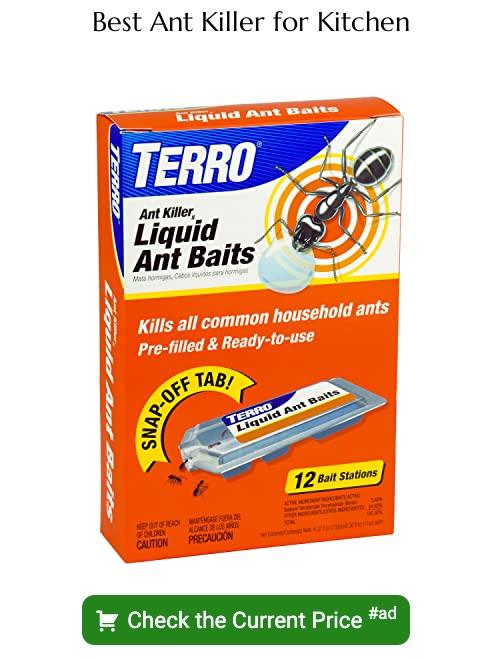Last updated on
Discover the effective methods to eliminate those pesky small ants that constantly invade your kitchen sink area and maintain a clean, ant-free space.
Do you ever feel like your kitchen sink has become a tiny ant kingdom? It’s not uncommon to find small ants crawling around on your counter and in your sink, especially during the warmer months. While these little critters may seem harmless, they can quickly become a nuisance if left unchecked.
Fortunately, there are several effective ways to get rid of small ants around your kitchen sink without resorting to harsh chemicals or expensive exterminators. In this article, we’ll explore some simple and natural solutions that will help you reclaim control of your kitchen and keep those pesky ants at bay.
What's Inside
Identifying Small Ants
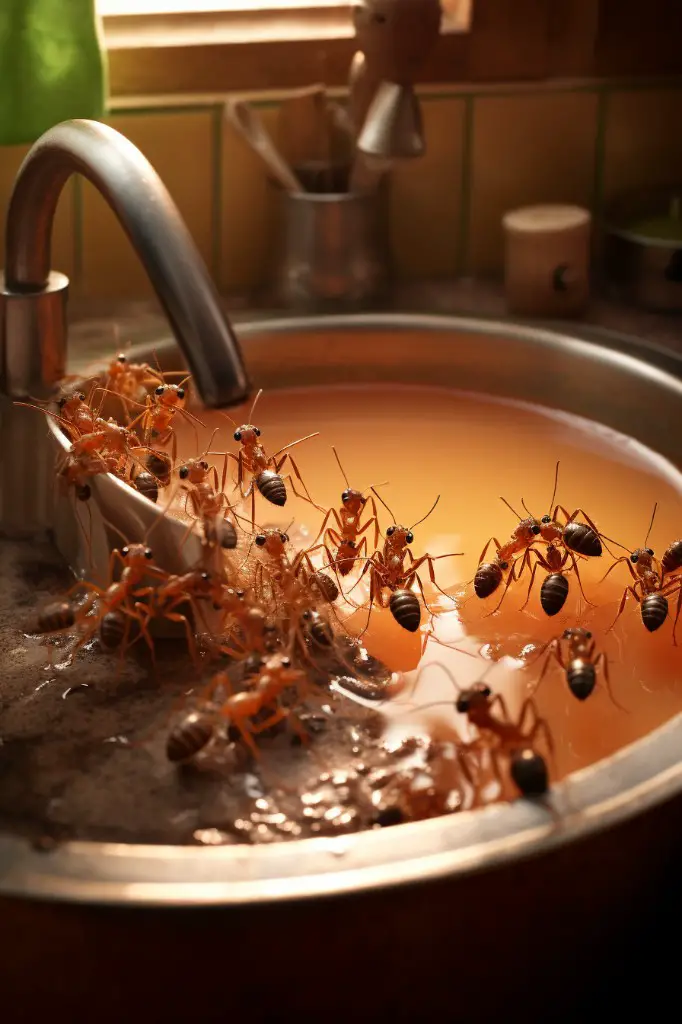
The first step in getting rid of small ants around your kitchen sink is to identify the type of ant you’re dealing with. There are many different species of ants, and each has its own unique characteristics and behaviors.
Some common types of small ants that may be found in your kitchen include pavement ants, pharaoh ants, odorous house ants, and thief or grease ant.
To identify the type of ant you have in your home, take a close look at their physical features such as coloration or size. You can also observe their behavior patterns like where they are coming from or what they seem to be attracted to.
Why Are Ants Around My Kitchen Sink?
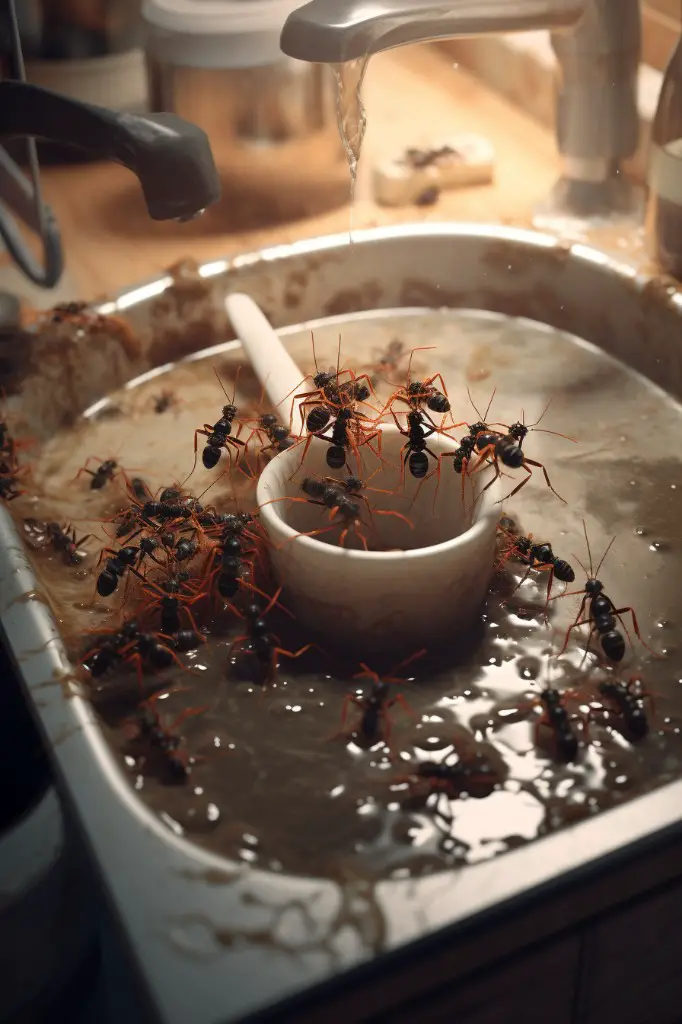
The most common reason is the presence of food particles and crumbs that have accumulated on surfaces around the sink. Ants can detect even the smallest amounts of sugar, grease, or other food residues from a distance and will quickly swarm in search of their next meal.
Another reason why ants may be present in your kitchen sink area is due to moisture problems. Leaky pipes or faucets provide an ideal environment for ants to thrive as they require water just as much as they need food.
Lastly, it’s important to note that some ant species are naturally drawn towards damp environments such as kitchens and bathrooms because these areas offer them a suitable habitat for nesting purposes.
By understanding why ants are attracted to your kitchen sink area, you can take proactive measures towards eliminating their presence altogether.
Signs of Ant Infestation
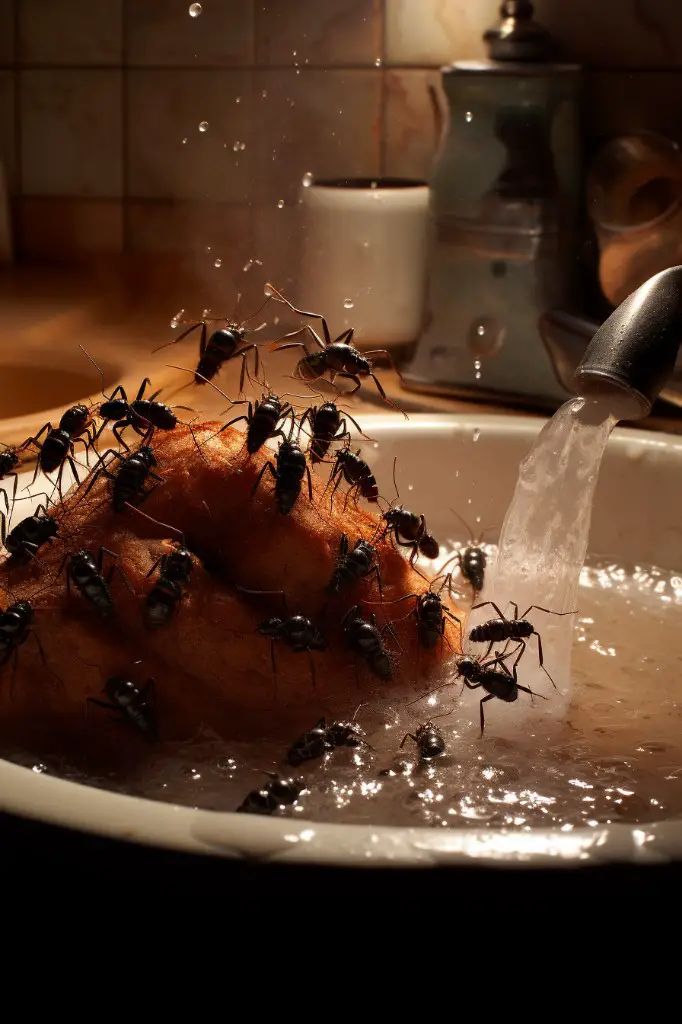
Ants are social insects and live in large colonies, so if you see one or two ants crawling around, there are probably many more hiding nearby. Some signs of an ant infestation include:
– Trails of ants: If you notice a line of tiny black or brown dots moving along your counter or floorboards leading to the sink area, this is a clear sign that there is an established colony nearby.
– Piles of debris: Ants often leave behind piles of dirt and debris near their nests as they excavate tunnels for their colony.
– Winged ants: During mating season (usually in the spring), winged male and female ants will emerge from their nest to mate. If you see these flying insects swarming around your kitchen sink area, it’s a sign that there is likely a mature colony somewhere close by.
Common Ant Species in Kitchen Sink
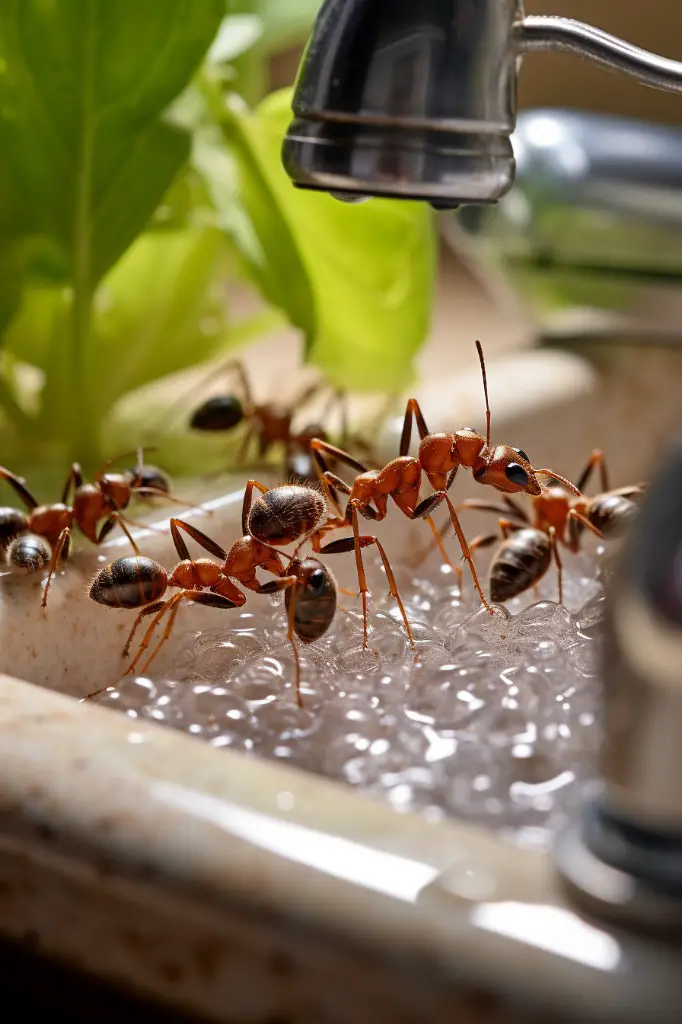
The most common ones include:
1. Argentine Ants: These small, brownish-black ants are attracted to sweet and greasy foods and often form large colonies.
2. Carpenter Ants: These larger black or reddish-brown ants prefer damp wood and can cause structural damage if left unchecked.
3. Odorous House Ants: These dark brown or black ants emit a strong odor when crushed, hence their name “odorous.” They feed on sweets, meats, and other household items.
- Pavement Ants: Small dark-brown to black-colored pavement ant is commonly found nesting under sidewalks but also invade homes for food sources like sugar water spills near the kitchen sink area.
- Pharaoh’s ant: Yellow colored tiny Pharaoh’s ant is known for its ability to infest hospitals where they pose a risk of spreading disease-causing bacteria from one patient room to another through their movement patterns.
Clean and Seal Surfaces
Ants are attracted to food particles, so it’s essential to wipe down counters, sinks, and other surfaces regularly. Use a mild soap or detergent solution when cleaning these areas as harsh chemicals can be harmful.
After cleaning the area thoroughly, make sure you seal any cracks or crevices where ants may enter your home. Check for gaps in windowsills, door frames, baseboards or anywhere else that could provide an entry point for these tiny pests.
Sealing off potential entry points will help prevent future infestations from occurring while also making it easier to control existing ones.
Fix Your Moisture Problem
Ants need water to survive, and a damp environment around your sink provides them with an ideal habitat. If you have a leaky faucet or pipes under the sink, it can create standing water that attracts ants.
To fix this problem, you’ll need to identify and repair any leaks in your plumbing system.
Another common source of moisture is condensation on pipes or appliances near the kitchen sink area. This can be caused by temperature changes between hot and cold surfaces or high humidity levels in your home.
To prevent condensation from forming, try insulating exposed pipes with foam insulation sleeves.
In addition to fixing leaks and reducing condensation, there are other steps you can take to reduce moisture levels around your kitchen sink area:
- Use exhaust fans when cooking or showering
- Wipe down wet surfaces regularly
- Keep dish towels dry between uses
- Repair any damaged caulking around sinks
Remove Food Sources and Clean Up Food Remnants
Ants are attracted to sweet, sugary substances, as well as greasy or oily foods. This means that even a few crumbs left on your counter can be enough to attract a swarm of ants.
To prevent this from happening, make sure you wipe down all surfaces in your kitchen regularly with soap and water. Pay special attention to areas around the sink where moisture tends to accumulate.
Use vinegar or lemon juice for extra cleaning power if needed.
Store all food items in sealed containers such as jars with tight-fitting lids or plastic bags so that they cannot be accessed by ants easily. Keep fruits and vegetables refrigerated when possible since these items tend not only attract small insects but also spoil quickly at room temperature.
Daily Cleaning Routine for Kitchen Sink Area
This will help eliminate any food sources and crumbs that may attract these pesky insects. Start by wiping down all surfaces around your sink, including countertops, faucet handles, and the sink basin itself with a damp cloth or sponge.
Next, make sure to clean up any spills or food remnants immediately after use. Don’t leave dirty dishes in the sink for too long as they can quickly become breeding grounds for ants.
It’s important to regularly sweep or vacuum floors near your kitchen sink area as well as wipe down cabinets and drawers where crumbs may accumulate.
Leak and Moisture Management
Ants need water to survive, and a leaky faucet or pipe can provide them with a constant source of it. Therefore, it’s essential to fix any leaks as soon as possible.
Check under your sink for any signs of water damage or mold growth that could be attracting ants. If you find any issues, repair them immediately before they become more significant problems.
Make sure that all surfaces around your kitchen sink are dry after use. Wipe down counters and sinks regularly with a clean cloth or paper towel to remove excess moisture.
Natural Ant Repellents
One of the most effective is vinegar. Simply mix equal parts water and white vinegar in a spray bottle and apply it to any areas where ants are present.
The strong scent of the vinegar will repel them, preventing them from returning.
Another option is peppermint oil, which has been shown to be an effective deterrent for many types of ants. Mix 10-15 drops of peppermint oil with one cup of water in a spray bottle and apply it around your kitchen sink area or anywhere else you’ve noticed ant activity.
Cinnamon powder can also be used as an ant repellent due to its strong smell that disrupts their pheromone trails leading other ants into your home.
Other natural remedies include citrus peels (lemon or orange), coffee grounds, bay leaves or even chili pepper flakes sprinkled around entry points like windowsills and doorways where they may enter from outside.
DIY Ant Traps
These traps work by luring ants in with sweet or protein-based bait, which they then carry back to their colony. Once the poison is distributed throughout the nest, it can effectively eliminate the entire ant population.
To make your own DIY ant trap at home, all you need is some borax powder (which can be found at most hardware stores), sugar or honey as bait and water. Mix equal parts of borax powder and sugar/honey in a bowl until well combined.
Add enough water to create a thick paste-like consistency.
Next, take some small containers such as bottle caps or jar lids and fill them with the mixture. Place these homemade traps near areas where you’ve seen ants congregating around your kitchen sink area but out of reach from children/pets.
It’s important not to disturb any visible trails that lead up to these areas so that more ants will find their way into the trap over time.
Commercial Ant Solutions
These products are designed to kill ants on contact or disrupt their pheromone trails, making it difficult for them to navigate your kitchen sink area. However, keep in mind that many commercial ant sprays contain harsh chemicals that can be harmful to pets and children if not used properly.
When using a commercial product, always read the label carefully and follow the instructions closely. Some products require you to spray directly onto the ants while others need only a light misting around entry points or along baseboards.
It’s also important not to rely solely on these solutions as they do not address the root cause of an infestation – access points into your home from outside areas where ants live such as gardens or trees near windowsills etc.
Baiting Techniques
Ant baits work by attracting ants with a sweet or protein-based substance that they carry back to their colony, where it will eventually kill off the entire ant population.
When choosing an ant bait, look for one that specifically targets the type of ant you are dealing with. Different species have different food preferences and behaviors, so using a generic bait may not be as effective.
Place the bait near areas where you have seen ants congregating in your kitchen sink area. Be sure to follow instructions carefully and avoid placing baits near surfaces that come into contact with food or utensils.
It’s important to note that while baits can be highly effective at eliminating an existing infestation, they may take some time before showing results.
Targeting Ant Nests and Destroying Them
Ants are social insects that live in colonies or nests. If you can locate and destroy their nest, you’ll be able to eliminate the entire colony.
To find an ant nest, follow the trail of ants back from your kitchen sink area. The nest is usually located nearby in a warm and moist environment such as under a pile of leaves or near a water source like pipes or drains.
Once you have found the ant nest location, there are several ways to destroy it depending on its size and location. For outdoor nests that are visible on lawns or gardens use boiling water poured directly into them which will kill most if not all ants within minutes.
For indoor infestations where locating an underground colony may be difficult try using insecticides specifically designed for killing small household pests like boric acid powder mixed with sugar syrup placed strategically along trails leading up towards entry points into homes (such as windowsills).
It’s important always read instructions carefully before applying any chemical treatments indoors since some products may pose health risks when used improperly.
Chemical Ant Control
There are several types of insecticides available in the market that can effectively eliminate ants around your kitchen sink area. However, it’s important to use these products with caution as they contain harmful chemicals that can be dangerous for humans and pets if not used properly.
Before using any chemical ant control product, read the label carefully and follow all instructions provided by the manufacturer. Wear protective clothing such as gloves and a mask while applying insecticide sprays or baits.
It’s also essential to keep children and pets away from treated areas until it is safe for them to return. If you’re unsure about how best to use these products safely or have concerns about their potential impact on your health or environment, consider consulting with a professional exterminator who specializes in ant infestations.
Environmentally Friendly Options
One of the simplest methods is to use natural repellents such as peppermint oil, vinegar or lemon juice. These substances can be sprayed directly onto ant trails and entry points to deter them from coming back.
Another option is diatomaceous earth (DE), which is a fine powder made from fossilized algae that’s safe for humans but deadly for insects. Sprinkle DE around the perimeter of your sink area and in any cracks or crevices where ants may be entering.
You can also try using bait stations filled with borax mixed with sugar water, which will attract ants who will then carry it back to their nest and ultimately kill off the colony.
Proper Garbage Disposal
Ants can easily detect food remnants and sweet liquids, which often accumulate in your trash bin. To prevent this from happening, make sure that you dispose of all food waste properly.
Firstly, ensure that all perishable items are stored in airtight containers or bags before throwing them away. This will help to reduce odors and keep ants at bay.
Secondly, take out the trash regularly – preferably every day if possible – especially during warmer months when ant activity is high.
It’s also important to clean your garbage bin frequently with soap and water or disinfectant wipes to remove any leftover residue that may attract ants or other pests.
Safety Precautions
Always wear gloves and protective clothing when handling chemicals or pesticides. Keep children and pets away from treated areas until the product has dried completely.
If you’re using bait stations or traps, place them out of reach of children and pets. Be sure to read the label carefully before use, as some products may be harmful if ingested.
When hiring a professional exterminator, make sure they are licensed and insured. Ask about their methods for treating ant infestations around kitchen sinks specifically so that you can ensure safety measures will be taken during treatment.
Preventing Future Infestations and Sealing Entry Points
One of the most effective ways to do this is by sealing off any entry points that ants may be using to gain access into your home. Ants can enter through even the tiniest cracks and crevices, so it’s essential that you thoroughly inspect all areas around your kitchen sink and seal up any gaps or holes.
Start by examining windowsills, door frames, baseboards, and other potential entry points for small openings where ants could squeeze through. Use caulk or weatherstripping material as needed to fill in these gaps.
Another way to prevent future ant infestations is by keeping a clean house. Regularly sweep floors and wipe down countertops with soap and water after meals or food preparation sessions.
Store food in sealed containers rather than leaving them out on counters where they can attract pests.
Consider investing in an outdoor ant bait station if you have a persistent problem with ants entering your home from outside sources such as gardens or patios nearby.
Hiring Professional Exterminators
Hiring a licensed exterminator is often the last resort for homeowners dealing with persistent ant infestations that just won’t go away.
Professional exterminators have access to specialized equipment and chemicals that are not available over-the-counter. They also have extensive knowledge of different ant species’ behavior patterns, which allows them to identify entry points and nesting sites more effectively.
When hiring an exterminator, make sure they are licensed by your state’s pest control board or department of agriculture. Ask for references from previous clients and check online reviews before making a decision.
It’s also essential to ask about their treatment plan, including what chemicals they will use if any.
While professional pest control services can be costly compared with DIY solutions or natural remedies, they offer long-term relief from stubborn ant infestations around your kitchen sink area.
FAQ
What are the tiny ants around my kitchen sink?
The tiny ants around your kitchen sink are most likely attracted by standing water from leaky pipes, insufficient caulking, or other sources of pooled water.
Why do I suddenly have tiny ants in my kitchen?
Tiny ants suddenly appear in your kitchen due to the presence of a food source, such as honey, sugar, syrup, meat, fats, or breadcrumbs, which attracts them and leads to the formation of trails connecting their colonies to the food.
What is the fastest way to get rid of ants in the kitchen?
The fastest way to get rid of ants in the kitchen is to clean surfaces with lemon juice, use peppermint essential oil on cotton pads, display tansy flowers, and utilize cinnamon in various forms to deter ants.
How do I get rid of little bitty ants in my kitchen?
To get rid of little bitty ants in your kitchen, dab cotton balls in essential oils like peppermint, tea tree, or cinnamon and sprinkle diatomaceous earth in suspected areas.
What natural remedies can effectively deter ants from invading the kitchen sink area?
Natural remedies like sprinkling cinnamon, placing cucumber peels, and using white vinegar can effectively deter ants from invading the kitchen sink area.
How can I prevent small ants from returning to my kitchen once they have been eliminated?
To prevent small ants from returning to your kitchen after elimination, maintain cleanliness, store food in sealed containers, and seal possible entry points.
What are the most common types of ants found near kitchen sinks and how do their behaviors differ?
In kitchens, the most common types of ants are pharaoh ants and Argentine ants, where the former are attracted to greasy and protein-based food sources, while the latter prefer sweet foods.
